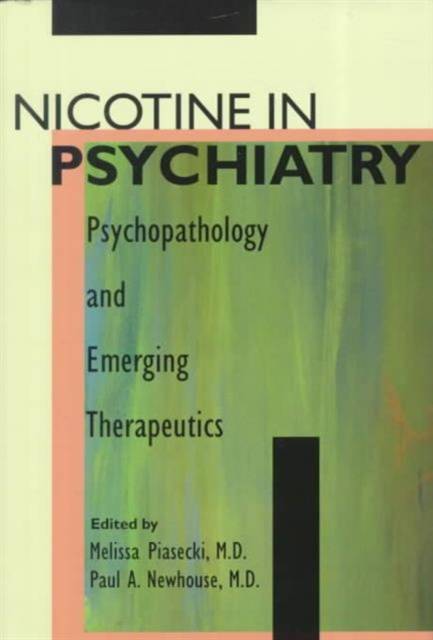
- Afhalen na 1 uur in een winkel met voorraad
- Gratis thuislevering in België vanaf € 30
- Ruim aanbod met 7 miljoen producten
- Afhalen na 1 uur in een winkel met voorraad
- Gratis thuislevering in België vanaf € 30
- Ruim aanbod met 7 miljoen producten
Nicotine in Psychiatry
Psychopathology and Emerging Therapeutics
Omschrijving
Today, 25% of Americans smoke and 50% of smokers die from tobacco-related illnesses. Meanwhile, little attention has been given to implementing cessation therapies for our patients who smoke.
Nicotine in Psychiatry: Psychopathology and Emerging Therapeutics examines this timely subject. The book's contributors, subject matter experts in the growing field of nicotine neurobiology andclinical pharmacology, cover the latest knowledge on - The pharmacokinetics and pharmacodynamics of nicotine- The effect of nicotinic receptors on the central nervous system (CNS), the recent advances made in understanding the normal function of these receptors, and how this knowledge transfers to the clinical treatment of many CNS disorders- Behavioral factors influencing the effects of nicotine and nicotine's addictive capacity- The association between smoking and specific mental disorders and the association between nicotine and mood- Clinical applications of nicotine as a potential therapeutic agent for a variety of disorders, such as attention deficit, Alzheimer's and Parkinson's diseases, epilepsy, inflammatory bowel disease, schizophrenia, and Tourette's syndrome- Nicotine replacement therapies and various smoking-cessation strategies
This book makes fascinating reading for anyone interested in the recent tobacco public policy debates, as well as clinicians and researchers looking for current information on nicotine and its clinical applications.
Specificaties
Betrokkenen
- Uitgeverij:
Inhoud
- Aantal bladzijden:
- 304
- Taal:
- Engels
- Reeks:
- Reeksnummer:
- nr. 48
Eigenschappen
- Productcode (EAN):
- 9780880487979
- Verschijningsdatum:
- 1/05/2000
- Uitvoering:
- Hardcover
- Formaat:
- Genaaid
- Afmetingen:
- 152 mm x 229 mm
- Gewicht:
- 639 g

Alleen bij Standaard Boekhandel
Beoordelingen
We publiceren alleen reviews die voldoen aan de voorwaarden voor reviews. Bekijk onze voorwaarden voor reviews.










